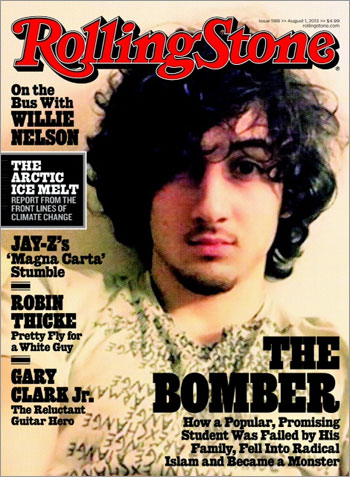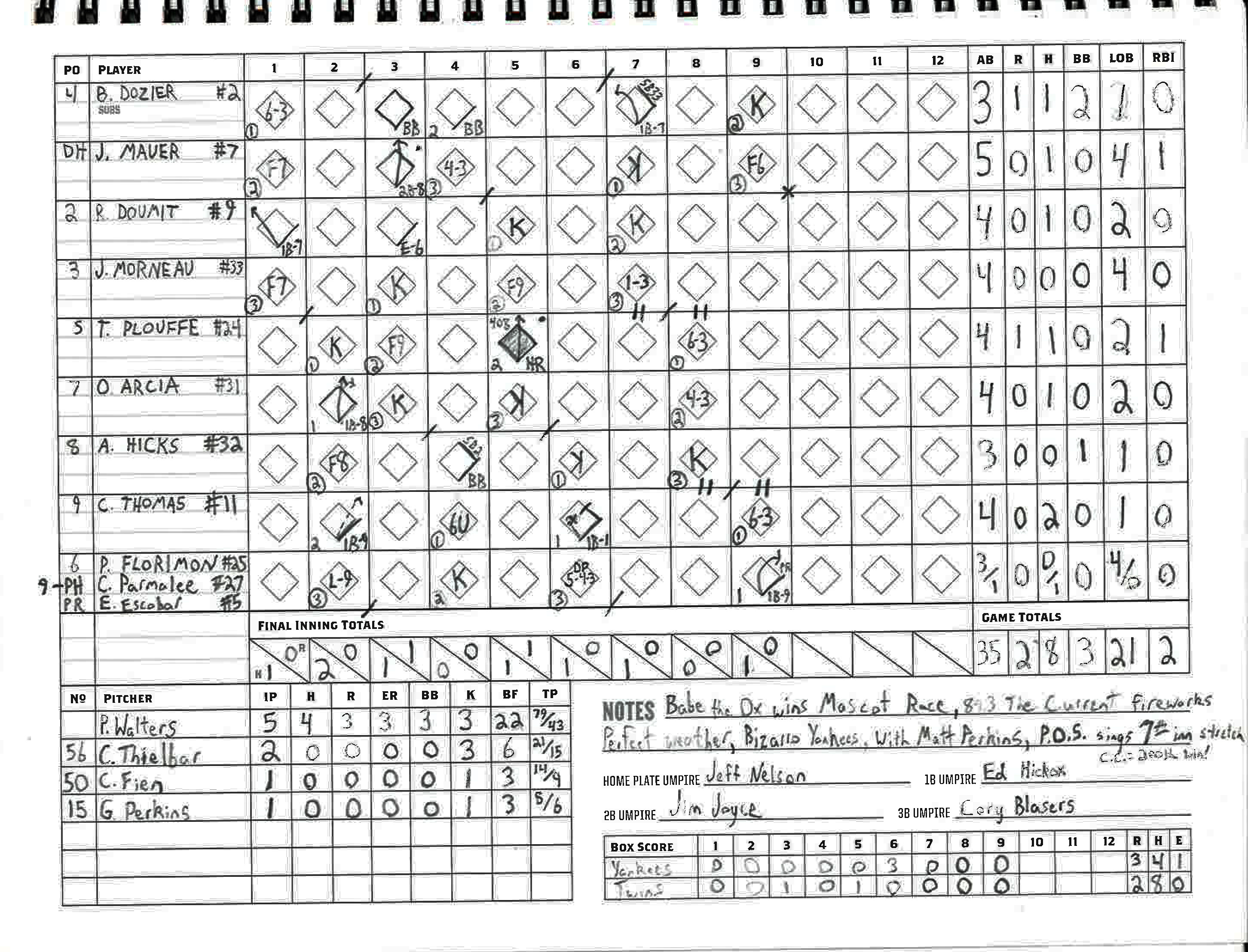1) ON THE COVER OF THE ROLLING STONE
Who knew Rolling Stone was the magazine for dreamboat terrorist cover boys? Should rename it Tamil Tiger Beat.
— Mo Rocca (@MoRocca) July 17, 2013
 Rolling Stone put Dzhokhar Tsarnaev on its cover this week, igniting howls of protest that the magazine is glamorizing terrorism. It doesn’t get published for a few weeks but the magazine put the image of the cover on its Facebook page yesterday.
Rolling Stone put Dzhokhar Tsarnaev on its cover this week, igniting howls of protest that the magazine is glamorizing terrorism. It doesn’t get published for a few weeks but the magazine put the image of the cover on its Facebook page yesterday.
Elaine Donovan, who lives in Boston’s Charlestown section, gave voice to the outrage:
I live in Charlestown, a one square mile town in Boston, approximately 2 miles from Boylston Street where the bombs went off. I’m not sure where the employees of Rolling Stone live, but I’m pretty sure that they live in this FREE Country where we all deserve to be safe. On April 15, 2013 all feelings of safety and security were gone from anyone that was even close to Boylston Street in Boston. Our lives changed drastically. We had to try to convince our young children that they were going to be okay when we didn’t know it ourselves!
After the bombs hit there was a 9 year old boy murdered as well as two young women. The people that were there that day that helped were true heroes! My neighbor, a 23 year old girl studying sports medicine in school, working the medical tent so proudly, was faced with horror that is only seen by soldiers in the most severe combat! She will never be the same! No one has asked her to grace the cover of your magazine!
How about Carlos Arredondo? The man who lost one of only two sons in Iraq and the other who couldn’t take the grief, to suicide a short time after. Carlos was at The Marathon to give out American flags to servicemen and women who ran. Thank God he was there as he held a makeshift tourniquet on Jeff Bauman’s leg saving him from bleeding to death! Have you contacted Carlos for your cover yet???
I am appalled to see this cover and hope that you will reconsider this as you would offend many fellow Americans as well as other innocent non Americans who ran that day, many of whom were not allowed to finish after this killer and his brother changed lives forever! I haven’t even mentioned the days following the bombing when were on “Lock Down” in our homes because this P.O.S. was running the streets like he owned the place! What is wrong with you people? What is wrong with our country where you can have the nerve to slap American consumers in the face who put food on your tables by purchasing your magazine?
I hope to God in the name of Martin Richard, Krystle Campbell, Lingzi Lu and MIT Officer Shawn Collier and the many amputees and other victims of this murderer that this is the end of your magazine. If you people can be so disrespectful and inconsiderate of innocent victims, by giving this S.O.B. one second of fame, then you don’t deserve our hard earned tax paying income!!!
There were a few new nuggets of information about the man accused of planting two bombs at the Boston Marathon. He had confided to his mother that he felt there were two people inside of him. She pushed him more toward Islam, Daily Mail says.
2) THE COMEBACK OF THE BASEBALL SCORECARD
My post earlier this week about the decline of the baseball scorecard and the people devoted to it has revealed hope. People have forwarded their stories of scorekeeping at ballgames to me and in several cases, they are young people, indicating there may be more life to the practice than the old codgers documenting its decline might realize.
One such whippersnapper, colleague Scott Olstad, stopped by the Official Cubicle yesterday to share his scorebook. Look closely, for there is beauty in this one:
“Babe the Ox wins the mascot race,” he reports on this game, held last week at Target Field. “P.O.S. sang during the seventh-inning stretch,” he adds.
Maybe not the kind of baseball statistic you might’ve found 20 years ago, but important nonetheless.
He got the inspiration for his scorebook from Bethany Heck of Columbia, South Carolina. She started a Kickstarter project to raise money to design a better baseball scorecard. Her goal was to raise $14,000; she raised twice that.
Reports of the tradition’s demise may be premature.
More baseball: Mariano Rivera enters last night’s All-Star game to “Enter Sandman” for a final time. (MLB) Warning: tissue worthy.
3) WHY CAN’T A LEMONADE STAND JUST BE A LEMONADE STAND?
I’d stop at more lemonade stands to help out the kids trying to raise comic-book money, but thanks to the creepy people who walk among us, nothing brings parents racing out of a house like an older man stopping for a lemonade sold by little kids.
Writer Michal Lemberger figures they should go out of business anyway. Writing in Slate, she says her kids’ lemonade stand didn’t teach her children anything about money. The juice sold out in less than a half hour and the kids didn’t have to do much to earn it.
Capitalism isn’t sentimental. It doesn’t coddle entrepreneurs. More businesses fail than survive. People think of lemonade stands as representative of pure enterprise, but in enthusiastically supporting them, they deny the true nature of our consumer culture, which rests on both the ideal and reality of competition and ruthlessness.
Something else was going on with my daughters’ customers, too. The sight of small children selling cups of lemonade stirred some sweet emotion in every adult who gladly handed over their dollar bills, from the local dry cleaner to the father driving his daughter home from summer camp. I couldn’t help but think that the pleasure they took in my children’s experience reflected wistfulness for their own lost youth. Mintz, the historian, agrees. “We live in a deep culture of nostalgia, because things change so quickly,” he told me. “We find it very difficult to give our kids the same kind of childhood we had.” A dollar must have seemed like a small price for my daughters’ customers to pay for the comfort of seeing small kids performing the exact same guileless ritual they had once performed in their childhood.
An exchange takes place between youthful lemonade vendors and their adult clients, but it’s not a capitalistic one. For adults, giving kids money is a chance to indulge in rosy-hued nostalgia. As for the kids, they get a chance to play “business,” just as they play dress-up or family. But adults usually fail to remember what the best part of the playacting is for the kids. My children, who were still young enough to think that two quarters add up to more money than a single dollar bill, were far more excited about giving out lemonade than about making money. It made them happy to see adults help them play out their vision of what a lemonade stand should be, cup by delicious cup. The only reason they sold lemonade instead of giving it away for free is that selling is a crucial part of the image of the lemonade stand.
Way to wring the goodness out of a simple lemonade stand.
Kai Ryssdal talked to her about this:
-
Audio not found
Some kids seem to be learning the economy just fine:
That video is from a few years ago. Those kids have since gone on to thriving careers in the airline industry.
4) A STEP TOWARD RACIAL EQUITY IN SAINT PAUL
The St. Paul school district has embraced a new racial equity policy, said to be the first of its kind in Minnesota, the Pioneer Press says. It aims to close the achievement gap and determine all the ways racial bias permeates the system.
One board member who voted no said there’s nothing in the policy to “to clarify its repercussions.” Another said there should be an acknowledgement that the achievement gap doesn’t fall on the school district alone.
The policy also calls for “recruiting, employing, supporting, retaining and continuously developing a workforce of racially conscious and culturally competent administrative, instructional and support personnel.”
The bookmobile has generally disappeared from the American landscape. Back in the day, the library on wheels would bring books to — mostly — kids in neighborhoods. Funding idled a lot of bookmobiles over the years and many kids lost interest in libraries — two facts that are likely related.
So it was encouraging to see a bookmobile returning to the St. Cloud area. A media specialist had heard of this idea — bookmobiles — at a conference. Maybe it’ll catch on. Supporters say it could help close the achievement gap.
(h/t: Will Lager)
Bonus I: Carnies 101. Dispute over vomit cleanup spurs alleged hammer attack by carnival worker in Fargo. (Forum)
Bonus II: Listen to me, local TV newspeople. There’s no way to do the “it’s hot” story in a new and refreshing way. The guy making an obscene gesture in this story is trying to tell you that in shorthand. We’re going to go out on a limb and guess that someone who works outside for a living in the summer, probably already knows about the need for hydration. They’re not fools.
Bonus III: There was a time — and not long ago — when women couldn’t cover sports because they weren’t allowed in the locker room to interview players. Last night, ESPN, which is spending the summer commemorating the beginning of Title IX, debuted “Let Them Wear Towels.”
TODAY’S QUESTION
Do ‘stand your ground’ laws make neighborhoods more dangerous?
WHAT WE’RE DOING
Daily Circuit (9-12 p.m.) – First hour: Job prospects for recent college grads
Second hour: Immigration policy and reforms.
Third hour: The rules of grief.
MPR News Presents (12-1 pm): A debate from the Aspen Ideas Festival: “Is Privacy Parmount, or Should We Live in a Transparent Society?”
The Takeaway (1-2 p.m.) – Are Congressional Leaders Failing? | World War II ‘Night Witch’ Dies at 91 | The Summer Music of 1993
All Things Considered (3-6:30 p.m.) – MPR’s Dan Gunderson checks in on the latest NASA mission as the agency continues to test the technology that will ensure that drone aircraft can successfully avoid commercial aircraft. The FAA will not approve drone use in commercial airspace until sense and avoid technology is successfully implemented.
Yariset Rodriguez tell us how she was able to graduate from high school even though the odds were not in her favor. She’s a second-generation Mexican-American who says her family has a bumpy past when it comes to education. And in the Minneapolis public schools, more than 20 percent of Latino students drop out. Yari talks to Colleen Kaibel, who runs the Check and Connect program in the Minneapolis public schools. The student-engagement program works with those at risk of dropping out. Yari also talks to her dad, who dropped out, earned his GED, and has encouraged her to stay in school. And Yari talks to her older sister who graduated from a private high school in the city and is in college.
Google Glass, the computer you’d wear like eyeglasses, takes pictures and video, among other things. It’s not equipped with certain controversial features, such as facial recognition technology. But that’s where hackers have entered the picture. All Things Considered will hack.

